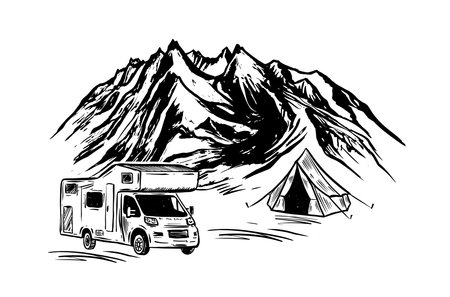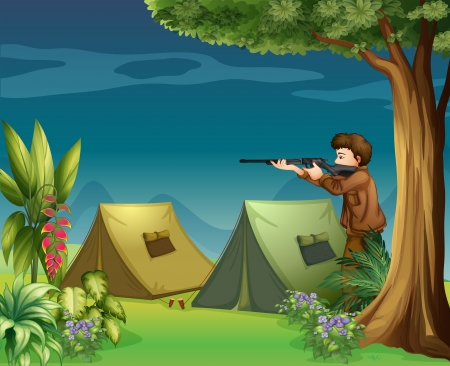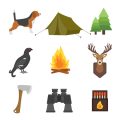Introduction to Wild Camping and Bushcraft in the UK
Wild camping and bushcraft have a certain romantic appeal for many outdoor enthusiasts across Britain. There’s something truly special about escaping the bustle of daily life, pitching your tent under the stars, and testing your self-sufficiency out in nature. Whether you’re keen on building shelters, lighting fires with traditional methods, or simply enjoying the peace of remote landscapes, these activities offer a unique sense of adventure and connection to the land.
However, practising wild camping and bushcraft in the UK comes with its own set of challenges and legal considerations. Unlike some countries where roaming freely is widely accepted, much of the British countryside is privately owned or protected by specific regulations. It’s essential for anyone planning an outdoor expedition to understand not just the practical aspects—like kit selection or survival skills—but also the local laws that govern where you can camp, what you can do, and how to minimise your impact. This guide provides a practical overview of what makes wild camping and bushcraft so appealing in Britain, while highlighting the key legal points you need to know before heading out for your next adventure.
2. Land Ownership and Access Rights
Understanding where you can legally camp or practise bushcraft in the UK starts with knowing the difference between public and private land. The rules vary significantly across England, Wales, Scotland, and Northern Ireland, and your rights as an outdoor enthusiast depend on both land ownership and local regulations.
Public vs Private Land: The Essentials
| Land Type | Access Rights | Implications for Campers/Bushcraft |
|---|---|---|
| Public Land (e.g. National Parks, commons) | Often open to walkers on designated paths; wild camping usually requires permission except in specific areas (e.g. Dartmoor National Park in England, much of Scotland under the Scottish Outdoor Access Code) | Check local bylaws; wild camping is rarely a given right except in Scotland. Bushcraft activities may be restricted. |
| Private Land | No automatic access; requires explicit permission from the landowner for any activity including walking, camping, or bushcraft | Trespassing is a civil offence. Always seek permission before setting up camp or practising bushcraft skills. |
| Rights of Way (Footpaths, Bridleways) | Legal right to pass through but not to camp or light fires; rights are usually limited to travelling along the path only | Setting up camp or stopping for bushcraft is not permitted without landowner consent. |
The Scottish Difference
Scotland offers unique freedoms thanks to the Scottish Outdoor Access Code:
- You have the right to access most land and inland water for non-motorised activities—including wild camping—provided you act responsibly.
- Certain areas (e.g. around Loch Lomond) have seasonal byelaws restricting camping, so always check current regulations.
- Bushcraft activities like fire lighting may be limited by environmental considerations or temporary restrictions due to dry weather.
Key Points for England, Wales & Northern Ireland
- No general right to wild camp: Most land is privately owned; even open countryside often has restrictions.
- Dartmoor National Park: The only place in England with a tradition of permitted wild camping—always check current maps and rules as boundaries can change.
- Bushcraft permissions: Cutting wood, making fires, or constructing shelters nearly always require express permission outside of designated activity centres or courses.
Your Responsibility as a Camper or Bushcrafter
If you’re heading out into the UK countryside, always establish who owns the land and what your access rights are before pitching a tent or starting any bushcraft project. Respecting boundaries and seeking permission ensures you stay on the right side of the law—and helps keep these places accessible for everyone in future.

3. Key Laws and Regulations
If you’re planning a wild camping or bushcraft adventure in the UK, it’s crucial to understand the legal landscape before you pitch up or start whittling sticks. Here’s a user-friendly breakdown of the most important laws and regulations you need to know.
Countryside and Rights of Way Act 2000 (CRoW Act)
The CRoW Act is a cornerstone for outdoor access in England and Wales. It grants the public the “right to roam” on mapped areas of open countryside, including mountains, moors, heaths, and downs. However, this right does not extend to wild camping—overnight stays generally require landowner permission unless otherwise stated. Lighting fires or building shelters can also be restricted under this act, so always double-check local rules and respect signs.
Scottish Outdoor Access Code
Scotland is much more permissive when it comes to outdoor activities. Thanks to the Land Reform (Scotland) Act 2003 and the Scottish Outdoor Access Code, you have the right to access most land and inland water for recreation—including wild camping—provided you act responsibly. This means camp in small numbers, keep away from buildings, leave no trace, and avoid causing damage or disturbance. Bushcraft activities are generally allowed if they don’t harm wildlife or property, but open fires should be handled with care and only where permitted.
Regional Differences Across the UK
England & Wales: Wild camping is largely prohibited without explicit landowner consent except for select areas such as parts of Dartmoor National Park (note: access rules here change periodically). For bushcraft, collecting firewood or making shelters is usually not allowed unless you have specific permission.
Northern Ireland: Public access is more limited compared to other UK regions. Most land is privately owned, so both wild camping and bushcraft require prior arrangement with landowners.
Scotland: As mentioned above, much greater freedom exists under the Outdoor Access Code, but responsible behaviour remains key.
Summary of Do’s and Don’ts
- Always seek landowner permission outside Scotland.
- Check local byelaws, especially regarding fires and overnight stays.
- Leave no trace: pack out all rubbish and avoid damaging natural habitats.
- Respect livestock, crops, wildlife, and fellow countryside users at all times.
Top Tip:
If in doubt, contact local authorities or park rangers before heading out—especially if you plan any activity beyond walking!
4. Campfires, Tools, and Environmental Considerations
When wild camping or practising bushcraft in the UK, it’s crucial to respect both the law and the natural environment. Here’s a practical guide on what you can and cannot do regarding campfires, tools such as knives and axes, responsible wood gathering, and minimising your environmental impact while staying legal.
Campfires: What’s Allowed?
In most parts of England, Wales, Scotland, and Northern Ireland, lighting open fires is generally not permitted without the explicit landowner’s consent. This is especially true in protected areas like National Parks or Sites of Special Scientific Interest (SSSI). Even if allowed, always use a fire pit or raised structure to avoid scorching the ground, and never leave a fire unattended. During dry spells or periods of high fire risk, local authorities may issue temporary bans.
| Region | Legal Status of Campfires | Special Notes |
|---|---|---|
| England & Wales | Not permitted without landowners permission | Strictly enforced in protected areas |
| Scotland | Permitted under Scottish Outdoor Access Code* | *Must exercise utmost care; avoid forests & peatlands during dry periods |
| Northern Ireland | Not permitted unless explicitly allowed | Check with managing authority or landowner first |
Use of Tools: Knives and Axes
Certain bushcraft activities require knives or axes for carving, splitting wood, or food prep. Under UK law, carrying a knife “without good reason” in public places is an offence. For bushcraft and camping purposes:
- Pocket knives: A non-locking folding blade under 3 inches (7.62 cm) is usually legal to carry.
- Larger fixed blades/axes: Require a clear justification (e.g., for camp tasks), and should only be carried directly to/from your campsite.
- No knives or axes in public spaces unless en route to/from legitimate wild camping activity.
Knife Law Quick Reference Table
| Type of Tool | Legal Status (General) | Conditions/Exceptions |
|---|---|---|
| Pocket Knife (Folding blade <3″) |
Permitted without specific reason | No locking mechanism; not for self-defence use |
| Larger Knife (Fixed blade/locking) |
Offence unless “good reason” | Bushcraft/camping accepted as “good reason” at campsite only |
| Axe/Hatchet/Saw | Permitted with “good reason” | Only at campsite for practical use; secure during transport |
Responsible Wood Gathering and Environmental Care
Treat the environment with respect by following Leave No Trace principles. Only collect dead wood found on the ground – never cut living trees or branches. In some places (especially managed woodlands), even collecting dead wood is prohibited due to conservation policies. Always check local rules beforehand.
- Avoid scarring trees: Do not strip bark or carve into living wood.
- No digging fire pits unless explicitly allowed.
- Packed-in fuel: Bring your own firewood or use portable stoves to reduce impact.
Top Tips for Minimising Impact While Staying Legal:
- Use a portable stove instead of open fires whenever possible.
- If fires are allowed, keep them small and contained.
- Scatter cold ash after ensuring it is completely extinguished.
- Avoid using soap or detergents near water sources.
The key takeaway? If in doubt, always seek permission first, use common sense, and prioritise environmental stewardship alongside legal compliance during your wild camping and bushcraft adventures in the UK.
5. Dealing with Landowners and Authorities
When it comes to wild camping or practising bushcraft in the UK, one of the most practical skills you can have is knowing how to interact respectfully with landowners and authorities. The legal landscape often means that land is privately owned or managed, so a positive approach can make all the difference.
Tips for Approaching Landowners for Permission
If you’re eyeing up a spot for your next wild camp or bushcraft session, always try to identify the landowner first. This could be a farmer, estate manager, or even a local authority. Approach them politely—either in person or with a well-written note if they’re not around. Be clear about your intentions, reassure them you’ll leave no trace, and specify your planned dates and activities. A bit of courtesy goes a long way; offering to share contact details and sticking to agreed boundaries shows respect for their property. Don’t be disheartened if you get a ‘no’—there are plenty of other places to explore.
What to Do If Challenged During Your Stay
If someone approaches you while you’re camping or practising bushcraft—whether it’s the landowner, an employee, or even a neighbour—stay calm and courteous. Explain what you’re doing, show any permission you’ve obtained (if applicable), and be prepared to pack up and move on if requested. Never argue or become confrontational; this rarely ends well and could jeopardise future access for everyone. Remember, in England and Wales especially, there’s no automatic right to camp on private land without permission.
Your Rights When Interacting with Police or Rangers
If police officers or countryside rangers approach you, know your rights but also remain cooperative. You may be asked to explain your presence; being honest about your plans helps. If you’re on private land without permission, they can ask you to leave, but unless another offence has been committed (such as causing damage or refusing to move on), it rarely leads to prosecution. Always comply promptly if asked to move—refusing could escalate matters unnecessarily. In Scotland, thanks to the Land Reform (Scotland) Act 2003, you have broader rights of access as long as you act responsibly, but even then, certain areas may have restrictions.
Essential Takeaway
Building good relationships with landowners and dealing sensibly with authorities will open up more opportunities for responsible wild camping and bushcraft across the UK. Respect is key: treat the land—and its owners—with care, follow any rules given, and always be prepared to adapt your plans if necessary.
6. Practical Do’s and Don’ts
When it comes to wild camping and bushcraft in the UK, knowing the law is only half the battle—the rest comes down to responsible behaviour and practical know-how. Here’s some real-world advice to help you avoid common mistakes and ensure your adventures remain enjoyable, legal, and respectful.
Do: Seek Permission Where Required
Unless you’re in Scotland or specific areas of Dartmoor, always secure landowner permission before pitching your tent. Even where rights exist, like on Scottish access land, local guidelines still apply—check for restrictions and always be courteous if challenged.
Don’t: Leave a Trace
The golden rule is simple: take everything with you. Littering not only damages the environment but can also lead to increased scrutiny from authorities. Use a portable stove instead of open fires wherever possible, as fires are often prohibited or discouraged due to wildfire risk and potential damage to habitats.
Do: Keep a Low Profile
Arrive late, leave early, and camp out of sight of roads and buildings. Avoid noisy gatherings, large groups, or bright lights that could draw attention. Solo campers or pairs are less likely to cause concern or complaints from locals.
Don’t: Disturb Wildlife or Livestock
Stick to established paths when walking to your chosen spot, keep dogs under control, and never interfere with animals or their habitats. Remember that ground-nesting birds are especially vulnerable in spring and early summer.
Do: Respect Access Rights—and Limitations
England and Wales have strict rules about wild camping; even on ‘access land’, overnight stays are generally not permitted. In Scotland, follow the Scottish Outdoor Access Code: camp in small numbers, stay no more than two nights in one place, and avoid busy areas.
Mistakes to Avoid:
- Assuming all remote areas allow camping—always check local byelaws and signage.
- Setting up camp near water sources used for drinking by locals or livestock.
- Making obvious campfires, especially during dry spells—use a raised stove instead.
Common Pitfalls for Beginners
- Poor site selection—avoid marshy ground, steep slopes, or areas prone to flooding.
- Poor waste management—never bury toilet waste close to watercourses; pack out what you bring in wherever possible.
- Lack of awareness—failing to research the area’s specific rules or seasonal restrictions can result in fines or being moved on by rangers.
If in doubt, err on the side of caution. Being discreet, tidy, and respectful ensures wild campers and bushcrafters maintain a positive reputation—and keeps these precious freedoms alive for future generations.


